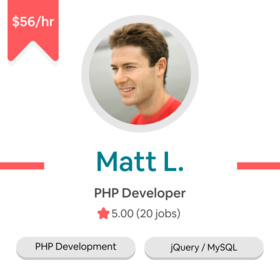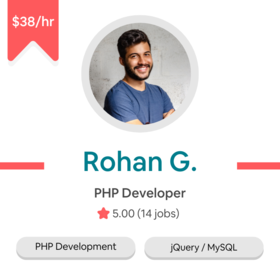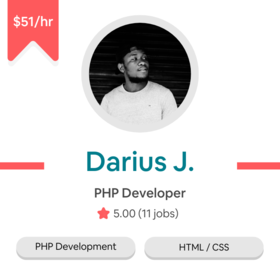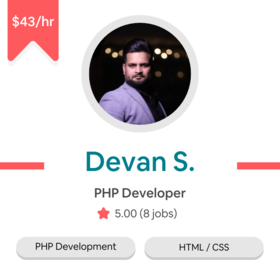













PHP, despite being more than 29 years old, maintains a respectable place in the web development world of today. The open-source general scripting language holds its importance in modern web standards, and it's actually still used as a back-end programming language by a whopping 76% of all websites in existence. In fact, the only thing that has become irrelevant about PHP is its original definition. PHP used to stand for "personal home page," but since it no longer reflects everything that the programming language can do, PHP now refers to the all-encompassing "hypertext preprocessor" to better indicate its capabilities.
PHP is best known for its simplicity, compatibility, flexibility, and scalability. Whether you're developing e-commerce, personal websites, or custom web apps for any purpose, few web technologies are better than PHP. Of course, you can only utilize PHP to its full potential if you have competent programmers and developers to build the application on your behalf. Cad Crowd staffing agency has the resources and the network to connect you with some of the most talented PHP developers from all around the world.
Similar to other scripting languages out there, PHP is essentially a tool that connects the database stored on the server side of a website or web app to the client side of it. PHP pulls the information from the database and presents it on the web page in HTML format. Here are just a few of PHP's praiseworthy highlights:
Note: if you’re using PHP for the server side, you don’t actually have to use PHP for the client side; it’s just that interacting with the data using another language may cause issues. The most common front-end programming languages paired with PHP at the back-end are HTML, CSS, and JavaScript.
PHP works on all major operating systems, such as Windows, macOS, and Linux. It also supports popular databases like SQLite, MySQL, and Oracle. You can run PHP on most servers, including Apache and IIS.
Over the last 10 years or so, people have been questioning whether PHP is worth developing in light of many newer programming languages. This is a valid question, considering how some old technologies are now rendered moot (remember Adobe Flash and Microsoft Silverlight?) when more advanced alternatives come to the surface. To some extent, PHP is like Java; both are old but persistent enough to stay as viable options among their younger, more sophisticated counterparts.
PHP is admittedly an aged web technology, and it lacks some features that otherwise come standard with the more recently invented programming languages. The good thing is that PHP turns out to be pretty stubborn and continues to evolve, maintaining great compatibility with new web developments and operating systems. As a matter of fact, the programming language has reached a stage of ubiquitousness to the point where developers might as well design something to work with PHP because it's actually a much more sensible decision rather than moving away from it entirely.
There’s little reason to stop using PHP simply because it’s a mature programming language. It’s a well-documented piece of web technology and well-supported by an active community of experienced developers. PHP has been around for 29 years, so it only makes sense if the programming language can now boast an extensive list of libraries, frameworks, and databases compatible with it.
PHP-based websites work with just about every CMS platform and can easily integrate with a wide range of add-ons to improve or extend the basic functionalities. Many of those add-ons are designed to make PHP faster and more efficient, delivering a dynamic and feature-rich user experience as expected by today’s standards. PHP remains in active development and gets even better with every new release.
Thanks to all its capabilities and compatibility features, it comes as a no-surprise that PHP is used as part of the web technology stack by some of the world’s most well-known companies and websites, for example:
In essence, PHP is a general-purpose scripting language well-suited to all sorts of web-based tasks, from sending emails and collecting form submissions to generating interactive web pages and handling an entire eCommerce website.
The main point of hiring PHP developers is to have them write server-side codes for an application to ensure good performance and stability. You’ll improve your chances of achieving the goal only if the developers have the necessary skills, including but not limited to:
And then, you also have to consider soft skills before making the decision to hire any developer. Apart from the usual traits such as dependable problem-solving abilities and good communication (which are always essential, of course), you want the developer to demonstrate good project management capability. Project management encompasses various skills such as being budget-conscious, multitasking, risk assessment, quality control, and leadership abilities.
With Cad Crowd staffing agency, you have multiple options on how to approach your hiring needs. We can provide you with an entire team of PHP developers (including a project manager and DevOps engineer) to oversee progress, individual developers qualified for the job requirements, or even freelancers. Our recruiters take time to listen to your hiring necessities and make sure that you have the best possible custom solution for your specific needs. We can always tailor our services depending on the timeline, urgency, project-specific constraints, and budget.
Being in the business for 15 years has afforded us the rare opportunity to maintain a large database of website and web app developer talents worldwide. A good portion of our database is filled with programmers specializing in PHP and other back-end technologies so that we can tap into our list and deliver the most qualified candidates for the open position. If need be, we can reach out to active online communities and our network of recruiters scattered all across the country to discover both active and passive candidates on behalf of your hiring manager as well. Give Cad Crowd a call at your convenience any day of the week to discuss everything in detail, and we'll send you a free quote based on the information you provide.
Ready to supercharge your web development projects with PHP? Look no further than Cad Crowd. Our pool of talented PHP developers brings extensive expertise in crafting robust and dynamic web applications. From backend development to database integration, our skilled PHP developers have you covered.
Experience the power of PHP with Cad Crowd. Whether you need to revamp an existing website, build a custom CMS, or create a scalable web application, our PHP developers have the knowledge and skills to deliver exceptional results. Take your web development to the next level by partnering with Cad Crowd.
Get a free quote or contact us today to discuss your PHP development needs, get a personalized quote, and embark on a journey of unparalleled web innovation. Let's build cutting-edge web solutions together with our top-notch PHP developers.


